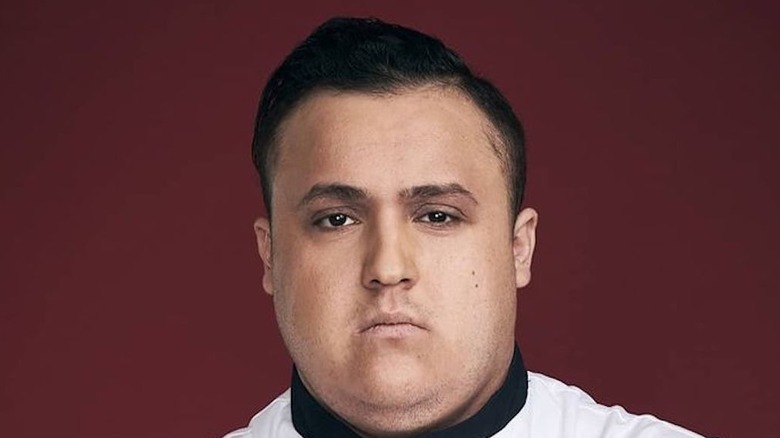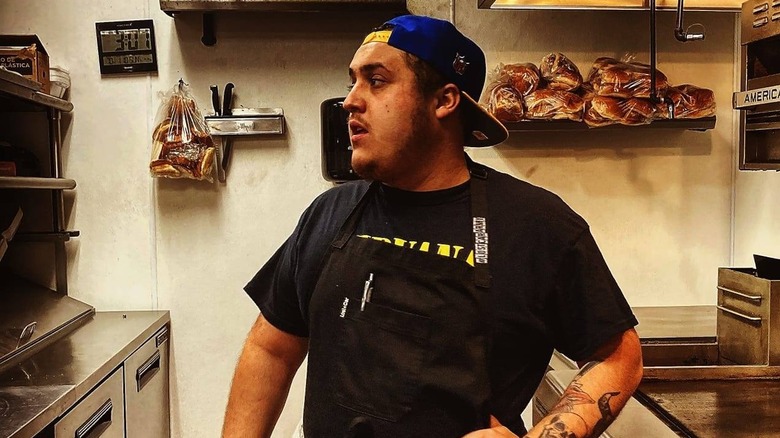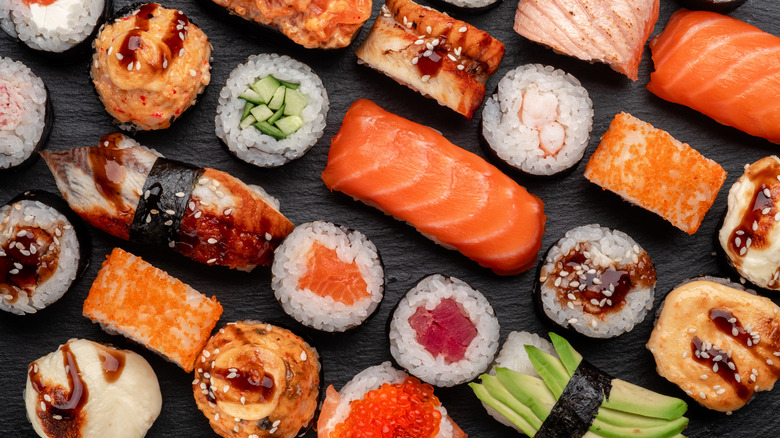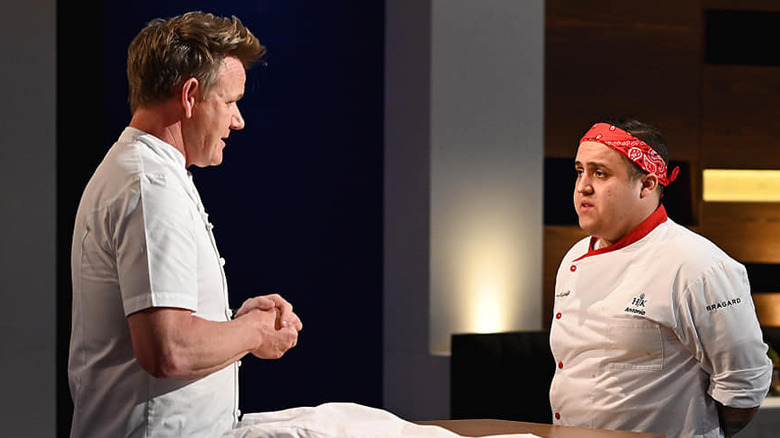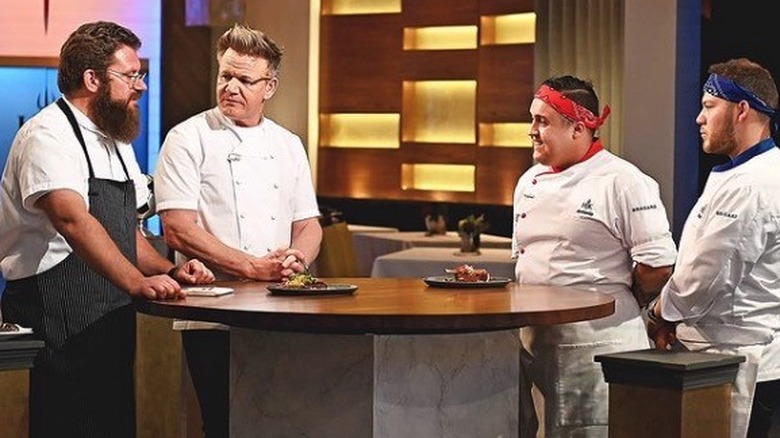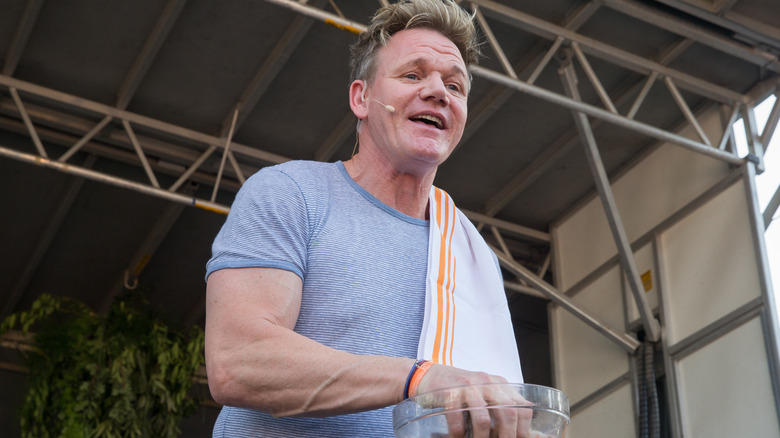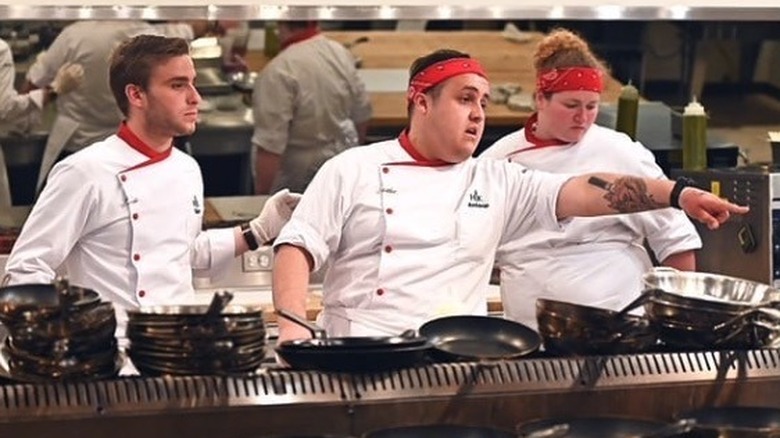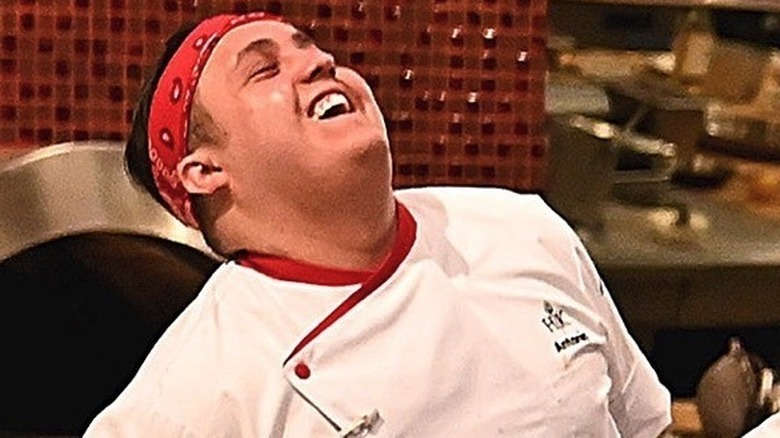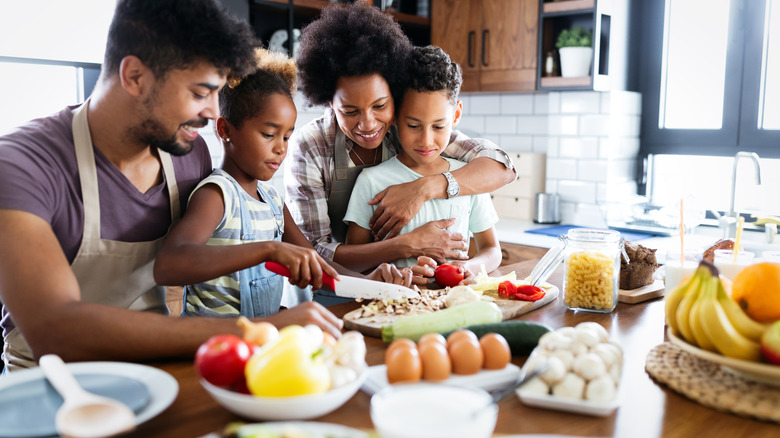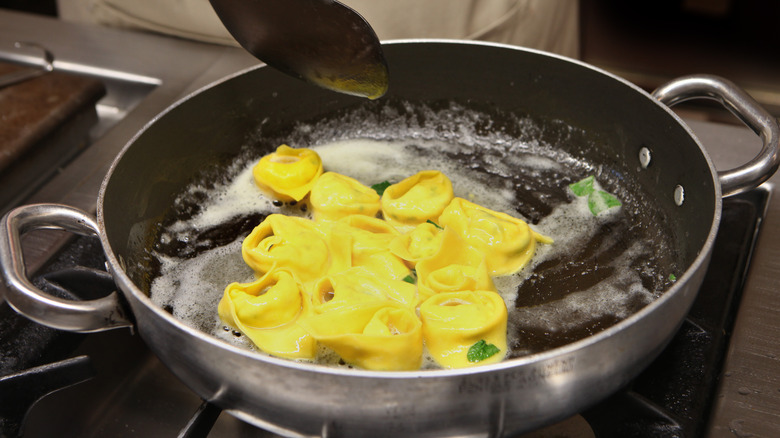Chef Antonio Ruiz Tells All About His Hell's Kitchen Experience - Exclusive Interview
Even if he had never appeared on "Hell's Kitchen: Young Guns," the 20th season of the show (and a season on which the chefs were indeed young — all under the age of 24, in fact) chances are good that Antonio Ruiz was still going to make a mark in the culinary world. Or a bigger mark, that is: well before his turn on the show was announced, already the young man had secured the position of executive chef at multiple hotels and restaurants, and he had already won attention and accolades all around and even beyond New Braunfels, Texas, his home base.
That said, appearing on "Hell's Kitchen" definitely helped Ruiz gain extra notoriety, not to mention gain a lot of knowledge and experience in a condensed amount of time thanks to all he learned from the show's host, a certain Mr. Gordon Ramsay, as well as from the other young chefs with whom he worked and competed. Today, chef Antonio is looking ahead to what is coming next in his career as a chef, to an initiative he is helping spearhead geared at supporting people struggling with mental health issues, and just maybe to other TV cooking opportunities. In the meantime, we asked the young chef to reflect back on his career so far, including his time on "Hell's Kitchen," of course, and tell us about all the ups, downs, and twists and turns along the way. Here is everything chef Antonio Ruiz shared with Mashed.
Antonio Ruiz developed an interest in cooking during childhood
Did you grow up cooking? If not, what got you interested in it?
My mom and my grandma were both in the kitchen pretty much every day. My grandparents were Italian and so I grew up with them being there pretty much always. My grandma had at an Italian restaurant, and so when I was 5, 6 years old, I had to go over there and help her set up for the day, whether it be just putting stuff out on the tables and [helping] getting things started, or doing that and just marking silverware and things like that, just being around that environment and seeing everybody prepping in the kitchen, that kind of thing, it was intoxicating.
Then my mom was a catering manager, so I got to see that kind of side of things, where you're having these big banquets for four or five hundred people, and just kind of seeing how food moves that way. It was an experience that, from such a young age, it just seemed like it was the right move. So after that, I just kind of had to keep going with it. My dad's Mexican, my whole dad's side of the family is Mexican, so just that kind of level of food mixed with the Italian kind of level of food, it just kind of felt like it was just part of my DNA. So from there, I had no choice.
Was there ever a time when you thought: "Okay, maybe I'll go to college and study this. Maybe I'll get a degree in that," or was it always pretty clear that you were going to be in the culinary world?
There was a time where I was very interested in writing, in English. I was pretty good at English, as well. So that was kind of a passion of mine, but then I kind of realized that I couldn't imagine myself sitting at a desk or at a keyboard, and that kind of thing. It's interesting, there's a different level — it's all creativity and stuff like that, [and] I've always kind of been interested in the creative side of things. But I think, just with food, it was something that I could really use my hands with and use that creativity, and then put it from in my head on paper, and then be like, "Okay. Well, this sounds like a cool idea," and then make it. Then it was like: "Okay, well this is it."
I think it kind of goes hand-in-hand, because I've always been interested in music, I've always been interested in English, I've always been interested in those creative things, that side of things. So I think it kind of coincides together with food. It is a poetry type of thing when you're making food. You have to have the right symmetry, the right everything, the right emotion into what you're doing to make a beautiful dish. So I think that's kind of where those things coincide.
Who were your early inspirations as you got into cooking?
So, it was my family directly, but I think the coolest thing I remember about when I was younger was watching the Food Network late at night and watching Emeril and seeing him do his little: "Bam! Kick it up a notch!", and watching Bobby Flay, watching "Iron Chef," the old "Iron Chef." I remember watching Morimoto, and then finally getting to work with him 20 years later. It's like, "Oh my God. I was watching you when I was a kid and now I get to be here next to you." Those [shows] were always kind of my thing. I never was really a cartoon kind of guy or anything like that, so my parents let me watch Food Network when I was little. So between my family and Food Network, the passion grew from there.
Chef Antonio Ruiz's favorite foods
What is your favorite cuisine to eat? And if different, what's your favorite type of cuisine to cook?
My favorite cuisine to eat is I think, honestly, Japanese cuisine. It's so technical and so clean, and I think there's something cool about that, especially when it's done properly. The tradition behind it is also rich. There's just something really cool about something that's been done for so long and it's honored to do that way, and so I think there's something really cool about that. And I think my favorite cuisine cook is also similar to that. I love the Japanese influence, and I love Asian influence, but I [generally] love things that take love, whether it be something like smoking a brisket for 12 hours, whether it be making a sauce for 12 hours, whether it be something where you actually have to put that time in and then you get that reward back at the end.
I think it's even more true — people always talk about, "The best food is made with love." I think those are the things where it is that time and dedication that you put into a dish, that I think that's the real best. Those are probably some of my favorite things to do. At my restaurant here in New Braunfels, we're braising short ribs for 11, 12 hours a day and it sells out almost immediately. You can taste that. I think that's probably my favorite thing to do, is just where you have to actually pay attention, and put time and effort and everything into it.
How chef Antonio Ruiz got on Hell's Kitchen
What made you want to try out for "Hell's Kitchen?"
Honestly, I was approached. I didn't really think about trying out for it, but then once I was approached for it, I had something in me, watching Gordon when I was little, thinking that this was really the test to my work [so far]. At that point, when I was getting approached, I was gaining some accolades and things like that. I really wanted to test myself and really put myself out there, and really try to do a new experience. I've always kind of suffered with social anxiety and stuff like that, so I kind of wanted to put that as a major test, not just with food, but just with myself and try to open myself up to new things and feel uncomfortable, really try to make it a challenge.
I used to write for a magazine here in New Braunfels, that kind of was Texas-based and everything. The restaurant I was working at, I was there for about three or four years before "Hell's Kitchen" approached. I had gotten [named] "Best Chef in New Braunfels" three out of five years. I got named in the top 10 restaurants in the Hill Country. It was just one of those things where everything was just kind of blowing up, so I felt that notoriety and I was like, "Okay. Well, cool. Maybe I am as good as I think I am." So I was like, "Well, let me go out there and prove it."
Antonio Ruiz dishes about his time on Hell's Kitchen
Once you were on the show, how was the experience similar to your expectations and how was it different?
It was very similar to what I was expecting. I was expecting the fire, the hot, the major challenge. I was waiting to see if it was really going to be as bad as people say it was. I was kind of thinking that it wasn't going to be as real. Everyone has these perceptions about TV where it's like, "Oh, that's staged, or that's not this," or whatever. Once you get there and you see everything rolling, there is no difference between what you see on TV and what's actually happening, so that was kind of different to me. I didn't think it was going to be as real as it was, and it was extremely real. It was extremely challenging.
They call it "Hell's Kitchen" for a reason. It does not lack on that aspect at all. You're challenged at every gate, from mentally to physically, to your actual cooking skills to your skills of being able to lead, to your skills to being able to manage people to be able to get along with people. It's not just the cooking aspect, it's everything as a person, totally. So it was definitely exceeding expectations in that aspect, because I was not expecting anything to be more, as an overall encompassing challenge, than just the cooking. So that was tough, but it was definitely cool to ... [be] uncomfortable and experience that growth.
Gordon Ramsay was just as Antonio Ruiz had expected
What was Gordon Ramsay like in person? Did he defy his reputation, live up to it, or a little of both?
No, he is exactly what you think Gordon is. But that doesn't necessarily mean — I feel like people think he's kind of a mean dude, but he's not. He's a classic chef, but he's just intense. Just like if you and I were sitting here right now, he's into you. So his eyes are in your soul, it's just one of those things where the intensity doesn't lack. There is never a moment with him that the intensity is not there. Even if he's being congratulatory or if he's being nice, the intensity's still right here. So that's just something to get used to, is that intensity. It never wavers and it's kind of cool to see, but it is definitely intimidating at first and then you kind of feel [okay with it].
For me, I've always been kind of into sports, playing basketball, playing football, things like that, and so I'm used to kind of that coach mentality. So it was kind of cool to see him as more of a coach and so that kind of made it a little bit easier, understanding that it's all just about making you better, making you better, making you better. So there really wasn't a time where I was like, "Oh, man. You're being an a**hole." It was always like, "Hey, bro. If you're saying it ..." He's obviously top five. If you put Cook Mount Rushmore up, he's one of the faces. So if you have a chance to learn from that, then you need to. So that was my mentality with him, is just he never says anything that he doesn't mean, or doesn't say anything that is not going to make anybody around him better. So that was just one of the things you had to get used to, is sometimes it's a little tough love, but it's all for the same purpose. It's all just to make everybody better.
Chef Antonio Ruiz on the challenges of Hell's Kitchen
What were a few of the biggest challenges and surprises from your time on the show?
Surprises were, I think, definitely for us, my season wasn't [so high drama]. You always watch it and you see all this drama, and all these fights, and everybody getting so heated, and I think everyone on my season, we all had the same mentality of just trying to make it forward and move forward one more day. Everyone was pretty helpful. It didn't matter if you crossed team lines, it didn't matter if it was red, blue, green, or whatever, we were all just trying to make each other happy and really try to make each other better. So it was kind of cool to see that level of camaraderie.
We're 20 seasons in and I haven't seen anybody [work together] as much as we did. I think it just kind of stems from the "Young Gun" thing, is that we all, I don't know if we were not as jaded as maybe some of the older generations or whatever, but we just really wanted to try to succeed and I think that was kind of the coolest thing about us. The biggest surprising thing to me was that everyone from pretty much the entire cast was very, very supportive of everyone, so that was cool.
Then I think, other than that, just being around it all. I don't think [someone] can understand — it's weird until you're there, but until actually being in that environment, it's a whole other world. You're working in one of the best kitchens in the world. You're working with one of the best chefs in the world. You're working with Chef Christina, you're working with Chef Jay. Being around that immense talent, it's like being in an all star game, and then everyone around you is just so good as well. You're immersed in this crazy amount of talent for weeks at a time, and that's just a whole other level of things, I don't think anybody can prepare for that. You're there and it's a whole other level and a whole other world.
What it's like off camera on the Hell's Kitchen set, according to Antonio Ruiz
What was it like behind the scenes during your time on the show?
It was fun. Behind the scenes, we were doing [well]. All of us were getting along. All of us were cracking jokes every night. I don't think there was a time where anybody was seriously beefing or having any fights or things like that. We were all pretty much, if we weren't on camera, we were in the back. There were a lot of smokers, a lot of things like that. People were just in the back, either smoking a cigarette, having a beer or whatever, and studying the menus and just talking.
I think a lot of us were from not the greatest circumstances, when it comes to life and stuff like that, so all of us are pretty moldable and all of us are pretty adaptable when it comes to that stuff. So I think it was really cool to be a part of all those kinds of lives. Everyone just kind of had the mentality of, "Okay. Well, hey. Today was sh***y. Let's do it again tomorrow, let's see if we can do it again. Hopefully, we win or hopefully, we don't lose, but whatever. Hey, I want to help you, you want to help me, let's keep rolling. We got to do this together."
How has your time on "Hell's Kitchen" changed your life, or how do you anticipate it will change your life going forward?
Even right now, it is pretty recent, but it's just, "Hell's Kitchen," I think, has changed my life in a sense of it definitely changed who I am, in the sense of being around Gordon's intensity. I cannot accept anything other than what I'm trying to do as my best, and so it's just one of those things where I think some people get complacent in the things they do. It's easy to get complacent and it's cool being around Gordon, because with him, that man's been around for so long and done so many things. He is never complacent. I think it's really cool to see one of your role models never losing that fire. I strive to be like that and never lose my fire. Along with that, though, it allowed me to open up myself more, and be able to talk about things a little bit more, and not be so closed off. You had to be open when you were on that show. So moving forward, it's cool to be able to be more of an open person, and be able to talk about experiences, and being able to lend a voice when it's needed.
Then other than that, it's just been cool having the exposure. The immense amount of support that I had was incredible and it's cool to know people are on your team and move forward with that. Other than that, I'm trying, as of now, I'm starting a mental health initiative. I suffer with mental health myself, but the show allowed me to kind of have some publicity with that and I really want to make sure that people in the hospitality industry have a shoulder to lean on. I really want to try to start doing that, so I'm thankful for the show that I'm able to do that.
Antonio Ruiz offers a few tips for home cooks
What are some common mistakes that you see chefs making, and what's some advice you have for home cooks who want to take their cooking up a notch?
Okay. Yeah, so for home chefs, I think the number one thing that I've noticed with everybody is being scared of salt. Even just seeing at restaurants, when I came back from "Hell's Kitchen" and I was cooking at my restaurant, I had gotten plate after plate after plate coming back like, "Oh, this is too salty. This is too salty. This is too salty." I think people, you have to understand, when you're cooking at home, don't be afraid to grab some lemon juice, don't be afraid to grab some white wine, don't be afraid to grab some black pepper, just basics. At the end, don't try to reinvent the wheel. Start with what you're trying to make and make that the best you possibly can. There's not much of a difference between if you make a beef Wellington at home and Chef Ramsay is making his beef Wellington, the biggest difference is the fact that his beef Wellington is the best you're ever going to have because he makes sure. He's looking at salt, he's looking at acid, he's looking at every single part of that dish.
So you can take that same philosophy and take it to anything you want at home, whether you're making spaghetti, whether you're making lasagna, whether you're making tacos at home, whatever. Anything that you're making at home, you want to make sure that the acid's there, the fat's there, the salt's there, and don't be afraid to over-season them. There is a time where obviously if it's too salty, it's too salty then, but don't be afraid of that salt. There's something there, you'll start to see that the more that you bring it out. Taste something raw first, before you add any seasoning at all, and just see what your base level is. Just add a little bit more, a little bit more, a little bit more, and you'll kind of see those flavors change.
That's kind of the cool thing about cooking ... you have an ability to experiment and don't be afraid of that. There's something beautiful about adding the perfect amount of lemon, or the perfect amount of white wine, the perfect amount of salt, and it's not hard to get once you start really trying to taste that and extend your palate. But don't be afraid of seasoning, that's probably one of the biggest things I'd say to people. I think that's something that you just have to cook every day and experiment with.
Chef Antonio Ruiz's favorite things to cook
Do you have a single favorite dish to prepare?
I think my favorite thing, I'm a big sucker for pasta. I love making homemade pastas, whether it be raviolis, whether it be linguini, or spaghetti, or things like that, where you actually have to [work it]. Anything with my hands, I'm a big fan of it, but pasta just has a special place in my heart with my Italian background. So I love that, and then having to make a sauce. There's just something beautiful about that artistry for me. So I love a good pasta dish and a good sauce dish, it's a beautiful thing.
Is there a dish that customers ask for all the time that you just hate making, even though you'll still do it anyway?
Not really. I don't think there's really any dishes that I hate cooking. I think my biggest thing is when people make [too many changes]. Obviously, if you go to a restaurant and you're spending your money, you deserve to have what you want. But at the same time, I think when you go to a restaurant and you're going there for the artistry, if you know somebody has really good food, I think it's weird when people try to sub things out. It's like, "Okay. Well, I want this, this, and this, but I want to sub this, this, and this, and this, this, and this." It's like, "Okay. Well, that's not even the same dish anymore." That's kind of the thing that I'm not really too fond of, but like I said, it's just a restaurant. You come here to spend your hard-earned money and you deserve to have it the way you want it. But at the same time, you got to appreciate the art and the level of that palate, then that's kind of where you're going from. So that's one of my little irks, but other than that, no. I have no problem cooking anything.
Follow Chef Antonio Ruiz on Instagram and check out his work with Our Commitment that's geared toward mental health support for hospitality industry workers.
